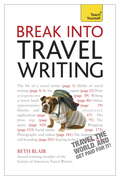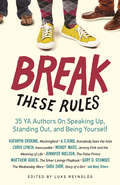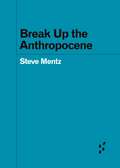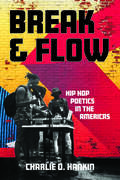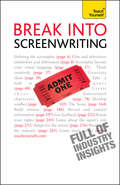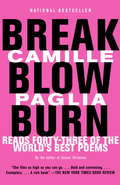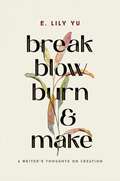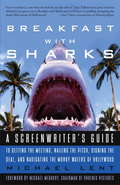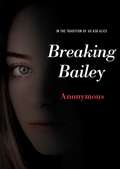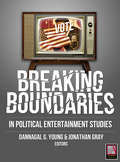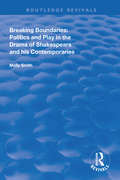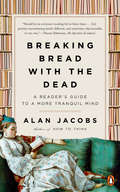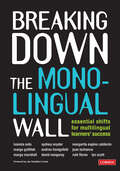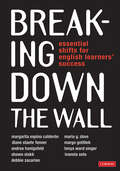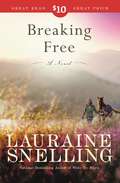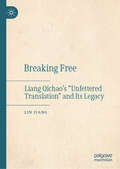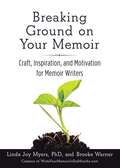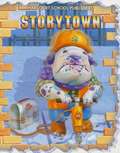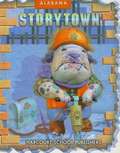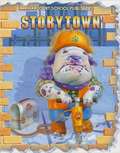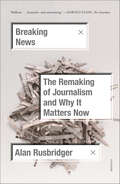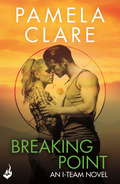- Table View
- List View
Break Into Travel Writing: Teach Yourself Ebook Epub
by Beth BlairGetting paid to go on holiday may sound like a great lifestyle. But there's a lot of hard graft involved - particularly, breaking into this industry in the first place. Few industries have changed as rapidly as publishing, and within publishing few areas have changed as rapidly as travel publishing. This book will bring you bang up-to-date with the latest trends in blogging, social media, magazines, websites, travel guides, and travel books. It provides specific advice for each sector, on how to write and, just as importantly, how to get published. Written by Beth Blair, an American travel writer who has been published in books, magazines, and online, this book is full of practical and inspiring advice that will help you broaden your horizons and turn your travel writing into cash.
Break These Rules: 35 YA Authors on Speaking Up, Standing Out, and Being Yourself
by Luke ReynoldsMiddle grades and young adult authors speak candidly on the unspoken "rules" of adolescence in this collection of moving, inspiring, and often funny essays. This unique volume encourages readers to break with conformity and defy age-old, and typically inaccurate, orthodoxy--including such conventions as Boys can't be gentle, kind, or caring; One must wear Abercrombie & Fitch in order to fit in; Girls should act like girls; and One must go to college after finishing high school. With contributions from acclaimed, bestselling, and award-winning young adult authors--including Gary D. Schmidt, author of The Wednesday Wars; Matthew Quick, author of The Silver Linings Playbook; Sara Zarr, author of Story of a Girl; and Wendy Mass, author of A Mango-Shaped Space--this collection encourages individuality by breaking traditionally held norms, making it an ideal resource for tweens and teens.
Break Up the Anthropocene (Forerunners: Ideas First)
by Steve MentzTakes the singular eco-catastrophic &“Age of Man&” and redefines this epoch We live in a new world: the Anthropocene. The Age of Man is defined in many ways, and most dramatically through climate change, mass extinction, and human marks in the geological record. Ideas of the Anthropocene spill out from the geophysical sciences into the humanities, social sciences, the arts, and mainstream debates—but it&’s hard to know what the new coinage really means. Break Up the Anthropocene argues that this age should subvert imperial masculinity and industrial conquest by opening up the plural possibilities of Anthropocene debates of resilience, adaptation, and the struggle for environmental justice. Forerunners: Ideas First Short books of thought-in-process scholarship, where intense analysis, questioning, and speculation take the lead
Break and Flow: Hip Hop Poetics in the Americas (New World Studies)
by Charlie D. HankinHip hop is a global form of creative expression. In Cuba, Brazil, and Haiti, rappers refuse the boundaries of hip hop’s US genesis, claiming the art form as a means to empower themselves and their communities in the face of postcolonial racial and class violence. Despite the geographic and linguistic borders that separate these artists, Charlie Hankin finds in their music and lyrics a common understanding of hip hop’s capacity to intervene in the public sphere and a shared poetics of neighborhood, nation, and transatlantic yearnings. Situated at the critical intersection of sound studies and Afro-diasporic poetics, Break and Flow draws on years of ethnographic fieldwork and collaboration, as well as an archive of hundreds of songs by more than sixty hip hop artists. Hankin illuminates how new media is used to produce and distribute knowledge in the Global South, refining our understanding of poetry and popular music at the turn of the millennium.
Break into Screenwriting: Your complete guide to writing for stage, screen or radio (TY Creative Writing)
by Ray FrenshamThis is a comprehensive, jargon-free guide for all budding screenwriters. Its aim is not just to guide you through the techniques and skills you need to write for the screen (film and television), but also to give you guidance on how to approach the industry as a whole. Focusing on every aspect of screenwriting, from how to set about the writing process to how to develop your characters, plot and structure, this book will give you all the guidance you need to break into this highly competitive industry and make a career for yourself as a screenwriter.NOT GOT MUCH TIME?One, five and ten-minute introductions to key principles to get you started.AUTHOR INSIGHTSLots of instant help with common problems and quick tips for success, based on the author's many years of experience.TEST YOURSELFTests in the book and online to keep track of your progress.EXTEND YOUR KNOWLEDGEExtra online articles at www.teachyourself.com to give you a richer understanding of screenwriting.FIVE THINGS TO REMEMBERQuick refreshers to help you remember the key facts.TRY THISInnovative exercises illustrate what you've learnt and how to use it.
Break, Blow, Burn
by Camille PagliaAmerica's most provocative intellectual brings her blazing powers of analysis and appreciation to bear on the great poems of the Western tradition, and on some unexpected discoveries of her own. Combining close reading with a panoramic breadth of learning, Camille Paglia refreshes our understanding of poems we thought we knew, from Shakespeare's "Sonnet 73" to Shelley's "Ozymandias," from Donne's "The Flea" to Lowell's "Man and Wife," and from Dickinson's "Because I Could Not Stop for Death" to Plath's "Daddy."Paglia also introduces us to less-familiar works by Paul Blackburn, Wanda Coleman, Chuck Wachtel, Rochelle Kraut-and even Joni Mitchell. Daring, riveting, and beautifully written, Break, Blow, Burn will excite even seasoned poetry lovers, and create a generation of new ones.From the Trade Paperback edition.
Break, Blow, Burn, and Make: A Writer's Thoughts on Creation
by E. Lily YuFrom the award-winning author of On Fragile Waves comes an inspirational, surprising guide to creation and creativity, and how both bring us closer to God. Centuries ago, sound theology and good fiction were friends and not strangers. Decades ago, authors strove not for self-expression and self-disclosure but for a mastery of craft and language and books that transformed the reader with wisdom and love. In more recent years, the old ideals have been exchanged for lesser ones. Few guides to writing, which tend to focus on mechanics, point of view, and plot, address the more important matters of meaning, depth, and heart. But it is the latter qualities that make a book a blessing and gift to both writer and reader. Like Christ&’s invitation to follow, they demand a risk and sacrifice of the self and all it holds dear. Writers from George MacDonald to James Baldwin understood this, but in recent years this understanding has been lost. Making old things new, this book proposes an ethics of reading, writing, and living based on truth and love. Break, Blow, Burn, & Make returns the literary conversation to the practices of co-creation with God. Part bugle call, part compass for writing and for life, and part love song to the books that set us on fire, it offers those who are willing to receive it the courage to live, read, and write more deeply and honestly.
Breakfast with Sharks: A Screenwriter's Guide to Getting the Meeting, Nailing the Pitch, Signing the Deal, and Navigating the Murky Waters of Hollywood
by Michael LentWhat They Didn't Teach You in Your Screenwriting Course. Screenwriters, listen up! Breakfast with Sharks is not a book about the craft of screenwriting. This is a book about the business of managing your screenwriting career, from advice on choosing an agent to tips on juggling three deal-making breakfasts a day. Prescriptive and useful, Breakfast with Sharks is a real guide to navigating the murky waters of the Hollywood system. Unlike most of the screenwriting books available, here's one that tells you what to do after you've finished your surefire-hit screenplay. Written from the perspective of Michael Lent, an in-the-trenches working screenwriter in Hollywood, this is a real-world look into the script-to-screen business as it is practiced today. Breakfast with Sharks is filled with useful advice on everything from the ins and outs of moving to Los Angeles to understanding terms like "spec," "option," and "assignment. " Here you'll learn what to expect from agents and managers and who does what in the studio hierarchy. And most important, Breakfast with Sharks will help you nail your pitch so the studio exec can't say no. Rounded out with a Q&A section and resource lists of script competitions, film festivals, trade associations, industry publications, and more, Breakfast with Sharks is chock-full of "take this and use it right now" information for screenwriters at any stage of their careers. From the Trade Paperback edition.
Breaking Bailey (Anonymous Diaries)
by AnonymousIn the tradition of Go Ask Alice and Lucy in the Sky, this heart-wrenching story chronicles a girl&’s fatal experience with testing her moral limits and the dangers of addiction.Bailey welcomes a fresh start at the prestigious boarding school, Prescott Academy, far away from the painful memories of her mother&’s death and the unendurable happiness of her father and his new wife. She expects rigorous coursework and long hours of studying—what she doesn&’t expect is to be inducted into the Science Club, a group of wealthy and intelligent students who run a business cooking up drugs in their spare time. Suddenly, Bailey has everything she&’s ever wanted, including a sweet and handsome boyfriend named Warren, the brainy lead chemist in the Club. But as she wades deeper into the murky waters of their business, Bailey finds herself struggling to reconcile her new lifestyle with moral dilemmas she just can&’t ignore. Can she have it all without breaking?
Breaking Barriers (Great Minds Wit & Wisdom #Grade 5, Module 4)
by Great MindsNIMAC-sourced textbook
Breaking Boundaries: In Political Entertainment Studies
by Michael X. Delli Carpini Jonathan Gray Larry Gross Jeffrey P. Jones Roderick P. Hart Dannagal G. Young Lauren Feldman Megan R. Hill Geoffrey Baym Heather Lamarre Amber Day R. Lance Holbert Paul R. Brewer Arlene Luck Lindsay HoffmanThis book brings together a collection of scholars whose work is leading the field of political entertainment studies, and yet it crosses methodological divides to do so, with quantitative and critical/cultural perspectives both represented. Indeed, each author worked as a part of a pair, addressing a similar topic as a colleague from across the divide. The result is a series of essays that add to and move beyond the state of political entertainment research--not only in content, but also in approach--by challenging readers to expand their thinking on these topics outside of the regular strictures. It begins with direct discussion of methodological divides in the field, as Michael Delli Carpini and Jeffrey P. Jones offer an essay, response, and further response. Following this initial, explicit tackling of methodology and what is at stake, Geoffrey Baym and Lindsay Hoffman each examine partisan language and interviews in The Daily Show with Jon Stewart and The Colbert Report, respectively; Lauren Feldman and Paul Brewer examine satirical treatments of science; Amber Day and Heather LaMarre address the importance of Stephen Colbert's Super PAC; Dannagal G. Young and Roderick Hart discuss The Daily Show's treatment of political participation, citizenship, and social protest; and finally, Megan Hill and R. Lance Holbert each wrestle with developing a normative approach to political satire. Read what scholars think!
Breaking Boundaries: Politics and Play in the Drama of Shakespeare and His Contemporaries (Routledge Revivals)
by Molly SmithFirst published in 1998, this volume explores the period 1585-1649, identifying it as rich in innovative drama which challenged the boundaries between social, political and cultural activities of various kinds. Molly Smith examines ways in which texts by Renaissance authors reflect, question and influence their society’s ideological concerns. In the drama of Kyd, Shakespeare, Beaumont and Fletcher, Webster, Middleton, Massinger and Ford, she identifies the simultaneously serious and playful appropriation of popular cultural practices, an appropriation which is expertly reversed by authorities in the political drama of Charles I’s public trial and execution in 1649. This compelling interpretation of Renaissance drama will prove of value to students of literature and social history.
Breaking Bread with the Dead: A Reader's Guide to a More Tranquil Mind
by Alan JacobsFrom the author of HOW TO THINK and THE PLEASURES OF READING IN AN AGE OF DISTRACTION, a literary guide to engaging with the voices of the past to stay sane in the presentW. H. Auden once wrote that "art is our chief means of breaking bread with the dead." In his brilliant and compulsively readable new treatise, Breaking Bread with the Dead, Alan Jacobs shows us that engaging with the strange and wonderful writings of the past might help us live less anxiously in the present--and increase what Thomas Pynchon once called our "personal density."Today we are battling too much information in a society changing at lightning speed, with algorithms aimed at shaping our every thought--plus a sense that history offers no resources, only impediments to overcome or ignore. The modern solution to our problems is to surround ourselves only with what we know and what brings us instant comfort. Jacobs's answer is the opposite: to be in conversation with, and challenged by, those from the past who can tell us what we never thought we needed to know.What can Homer teach us about force? How does Frederick Douglass deal with the massive blind spots of America's Founding Fathers? And what can we learn from modern authors who engage passionately and profoundly with the past? How can Ursula K. Le Guin show us truths about Virgil's female characters that Virgil himself could never have seen? In Breaking Bread with the Dead, a gifted scholar draws us into close and sympathetic engagement with texts from across the ages, including the work of Anita Desai, Henrik Ibsen, Jean Rhys, Simone Weil, Edith Wharton, Amitav Ghosh, Claude Lévi-Strauss, Italo Calvino, and many more.By hearing the voices of the past, we can expand our consciousness, our sympathies, and our wisdom far beyond what our present moment can offer.
Breaking Down the Monolingual Wall: Essential Shifts for Multilingual Learners′ Success
by Margarita Espino Calderon Margo Gottlieb Ivannia Soto Sydney Cail Snyder Andrea Honigsfeld Joan R. Lachance Margarita Marshall David Nungaray Rubí Flores Lyn ScottYour guide to culturally and linguistically sustaining practices in your dual language classroom and school. It’s time to set the record straight: Multilingualism is a tremendous asset that must be nurtured and valued and the most effective pathway to multilingualism is dual language education. Despite significant evidence attesting to the cognitive, social/emotional, and economic benefits of multilingualism, the majority of our classrooms and schools are monolingual. Encouragingly, recent shifts in state policies have increased the demand for dual language programming in our schools. This increased momentum brings new challenges, including the need for more bilingually authorized teachers, high-quality instructional resources, and accurate assessment and accountability in the target languages of instruction. With contributions from ten experts in multilingual education, Breaking Down the Monolingual Wall outlines the systemic and pedagogical approaches necessary for successful multilingual and dual language programs. The book supports educators to: Shift the paradigm from one that is subtractive and deficit-based to one that is additive and assets-based Embed culturally and linguistically sustaining practices in their instruction Understand how to promote multilingualism in the context of teaching academic content Develop assessments as, for, and of learning in multiple languages. Lead high-quality dual language schools and programs Recruit and retain highly qualified bilingual educators Offering a comprehensive overview of bilingual policies and historical context all educators should understand, Breaking Down the Monolingual Wall is an invaluable guide to creating dual language learning environments that build on the precious assets of our multilingual students and families.
Breaking Down the Monolingual Wall: Essential Shifts for Multilingual Learners′ Success
by Margarita Espino Calderon Margo Gottlieb Ivannia Soto Sydney Cail Snyder Andrea Honigsfeld Joan R. Lachance Margarita Marshall David Nungaray Rubí Flores Lyn ScottYour guide to culturally and linguistically sustaining practices in your dual language classroom and school. It’s time to set the record straight: Multilingualism is a tremendous asset that must be nurtured and valued and the most effective pathway to multilingualism is dual language education. Despite significant evidence attesting to the cognitive, social/emotional, and economic benefits of multilingualism, the majority of our classrooms and schools are monolingual. Encouragingly, recent shifts in state policies have increased the demand for dual language programming in our schools. This increased momentum brings new challenges, including the need for more bilingually authorized teachers, high-quality instructional resources, and accurate assessment and accountability in the target languages of instruction. With contributions from ten experts in multilingual education, Breaking Down the Monolingual Wall outlines the systemic and pedagogical approaches necessary for successful multilingual and dual language programs. The book supports educators to: Shift the paradigm from one that is subtractive and deficit-based to one that is additive and assets-based Embed culturally and linguistically sustaining practices in their instruction Understand how to promote multilingualism in the context of teaching academic content Develop assessments as, for, and of learning in multiple languages. Lead high-quality dual language schools and programs Recruit and retain highly qualified bilingual educators Offering a comprehensive overview of bilingual policies and historical context all educators should understand, Breaking Down the Monolingual Wall is an invaluable guide to creating dual language learning environments that build on the precious assets of our multilingual students and families.
Breaking Down the Wall: Essential Shifts for English Learners’ Success
by Debbie Zacarian Maria G. Dove Margarita Espino Calderon Diane Staehr Fenner Tonya W. Singer Margo Gottlieb Ivannia Soto Shawn M. Sinclair-Slakk Andrea HonigsfeldIt was a dark and stormy night in Santa Barbara. January 19, 2017. The next day’s inauguration drumroll played on the evening news. Huddled around a table were nine Corwin authors and their publisher, who together have devoted their careers to equity in education. They couldn’t change the weather, they couldn’t heal a fractured country, but they did have the power to put their collective wisdom about EL education upon the page to ensure our multilingual learners reach their highest potential. Proudly, we introduce you now to the fruit of that effort: Breaking Down the Wall: Essential Shifts for English Learners’ Success. In this first-of-a-kind collaboration, teachers and leaders, whether in small towns or large urban centers, finally have both the research and the practical strategies to take those first steps toward excellence in educating our culturally and linguistically diverse children. It’s a book to be celebrated because it means we can throw away the dark glasses of deficit-based approaches and see children who come to school speaking a different home language for what they really are: learners with tremendous assets. The authors’ contributions are arranged in nine chapters that become nine tenets for teachers and administrators to use as calls to actions in their own efforts to realize our English learners’ potential: 1. From Deficit-Based to Asset-Based 2. From Compliance to Excellence 3. From Watering Down to Challenging 4. From Isolation to Collaboration 5. From Silence to Conversation 6. From Language to Language, Literacy, and Content 7. From Assessment of Learning to Assessment for and as Learning 8. From Monolingualism to Multilingualism 9. From Nobody Cares to Everyone/Every Community Cares Read this book; the chapters speak to one another, a melodic echo of expertise, classroom vignettes, and steps to take. To shift the status quo is neither fast nor easy, but there is a clear process, and it’s laid out here in Breaking Down the Wall. To distill it into a single line would go something like this: if we can assume mutual ownership, if we can connect instruction to all children’s personal, social, cultural, and linguistic identities, then all students will achieve.
Breaking Down the Wall: Essential Shifts for English Learners’ Success
by Debbie Zacarian Maria G. Dove Margarita Espino Calderon Diane Staehr Fenner Tonya W. Singer Margo Gottlieb Ivannia Soto Shawn M. Sinclair-Slakk Andrea HonigsfeldIt was a dark and stormy night in Santa Barbara. January 19, 2017. The next day’s inauguration drumroll played on the evening news. Huddled around a table were nine Corwin authors and their publisher, who together have devoted their careers to equity in education. They couldn’t change the weather, they couldn’t heal a fractured country, but they did have the power to put their collective wisdom about EL education upon the page to ensure our multilingual learners reach their highest potential. Proudly, we introduce you now to the fruit of that effort: Breaking Down the Wall: Essential Shifts for English Learners’ Success. In this first-of-a-kind collaboration, teachers and leaders, whether in small towns or large urban centers, finally have both the research and the practical strategies to take those first steps toward excellence in educating our culturally and linguistically diverse children. It’s a book to be celebrated because it means we can throw away the dark glasses of deficit-based approaches and see children who come to school speaking a different home language for what they really are: learners with tremendous assets. The authors’ contributions are arranged in nine chapters that become nine tenets for teachers and administrators to use as calls to actions in their own efforts to realize our English learners’ potential: 1. From Deficit-Based to Asset-Based 2. From Compliance to Excellence 3. From Watering Down to Challenging 4. From Isolation to Collaboration 5. From Silence to Conversation 6. From Language to Language, Literacy, and Content 7. From Assessment of Learning to Assessment for and as Learning 8. From Monolingualism to Multilingualism 9. From Nobody Cares to Everyone/Every Community Cares Read this book; the chapters speak to one another, a melodic echo of expertise, classroom vignettes, and steps to take. To shift the status quo is neither fast nor easy, but there is a clear process, and it’s laid out here in Breaking Down the Wall. To distill it into a single line would go something like this: if we can assume mutual ownership, if we can connect instruction to all children’s personal, social, cultural, and linguistic identities, then all students will achieve.
Breaking Free: A Novel
by Lauraine SnellingBestselling author Lauraine Snelling crafts a poignant story of hope and restoration for a newly paroled mother rebuilding her life after the loss of her son.Maggie Roberts is starting over again after her reckless driving led to a 10-year prison sentence and the devastating loss of her son. Having learned to repurpose retired thoroughbred racehorses through an inmate training program, Maggie finds a way to rebuild her life. But it's not until she meets single father Gil Winters and his wheelchair-bound son, Edward, that she finds her calling. In helping Edward with his therapy using horses, Maggie finds herself coming to life again. But when a shadow from the past returns, Maggie is forced to choose between her newfound freedom and getting Edward the life-saving help he needs.
Breaking Free: Liang Qichao’s “Unfettered Translation” and Its Legacy
by Lin JiangThis book deeply examines the definition, formation, translation purpose, stylistic features, and modernity connotation of Liang’s “unfettered translation.” The book on Liang Qichao and his “unfettered translation” is the first of its kind in academia. This translation strategy, first adopted by Liang, played a crucial role in introducing Western learning and influencing late Qing Dynasty translators. Reflecting Liang’s political agenda, it aims to save the country and enlighten the people, promoting societal modernization and cultural exchange. The book offers Western readers insights into Liang Qichao’s translation and its impact on modern Chinese culture.
Breaking Ground on Your Memoir: Craft, Inspiration, and Motivation for Memoir Writers
by Brooke Warner Linda Joy MyersIn Breaking Ground on Your Memoir, Linda Joy Myers (President of the National Association of Memoir Writers) and Brooke Warner (Publisher of She Writes Press) present from the ground up—from basic to advanced—the craft and skills memoirists can draw upon to write a powerful and moving story, as well as inspiration to write, finish, and polish their own story. Full of rich insights and practical advice and strategies, Breaking Ground on Your Memoir offers all the tools writers need to write a powerful, publishable memoir. In this book you will discover: • how to get focused on what your memoir is about—your themes. • how to build the structure of your story. • techniques to make your memoir come alive. • the secrets of craft: how to write a great scene, colorful and memorable descriptions, narration, and flashback. • how to connect with your reader using through-threads and takeaway so they&’ll keep turning the pages, and learn something about their own lives by reading your book. Visit the authors online at WriteYourMemoirInSixMonths.com.
Breaking New Ground (Georgia)
by Isabel L. Beck Roger C. Farr Dorothy S. StricklandNIMAC-sourced textbook
Breaking News: The Remaking of Journalism and Why It Matters Now
by Alan RusbridgerAn urgent account of the revolution that has upended the news business, written by one of the most accomplished journalists of our timeTechnology has radically altered the news landscape. Once-powerful newspapers have lost their clout or been purchased by owners with particular agendas. Algorithms select which stories we see. The Internet allows consequential revelations, closely guarded secrets, and dangerous misinformation to spread at the speed of a click.In Breaking News, Alan Rusbridger demonstrates how these decisive shifts have occurred, and what they mean for the future of democracy. In the twenty years he spent editing The Guardian, Rusbridger managed the transformation of the progressive British daily into the most visited serious English-language newspaper site in the world. He oversaw an extraordinary run of world-shaking scoops, including the exposure of phone hacking by London tabloids, the Wikileaks release of U.S.diplomatic cables, and later the revelation of Edward Snowden’s National Security Agency files. At the same time, Rusbridger helped The Guardian become a pioneer in Internet journalism, stressing free access and robust interactions with readers. Here, Rusbridger vividly observes the media’s transformation from close range while also offering a vital assessment of the risks and rewards of practicing journalism in a high-impact, high-stress time.
Breaking Point: I-Team 5 (I-Team)
by Pamela ClareFans of Suzanne Brockmann, Maya Banks, Christy Reece, Julie Ann Walker and Cindy Gerard will adore Pamela Clare's expertly plotted romantic suspense series, which sets the pages alight with sizzling chemistry. For tension, thrills, romance and passion take a spin with the I-Team.While investigating border violence in Mexico, journalist Natalie Benoit is taken captive. Alone in the hands of ruthless killers, she needs every ounce of courage she possesses to survive. Chief Deputy US Marshal Zach McBride has endured a week of torture and interrogation at the hands of a bloodthirsty drug cartel. Hearing Natalie's cries spurs his survival instincts. With her help, Zach overpowers their captors and they flee. But past loss and tragedy leave each reluctant to follow their hearts, even as the passion between them reaches breaking point. Now they must fight to stay ahead of the danger that hunts them as forces more powerful than they can imagine conspire to destroy them both...Sexy. Thrilling. Unputdownable. Take a wildly romantic ride with Pamela Clare's I-Team: Extreme Exposure, Hard Evidence, Unlawful Contact, Naked Edge, Breaking Point, Striking Distance, Seduction Game.
